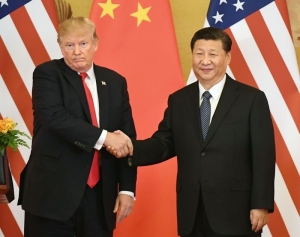


(Posted on 31/05/18)
As a follow-up to initial “constructive” trade discussions with a Chinese delegation headed by Vice Premier Liu Hei that concluded on 18 May in Washington, the Trump administration is preparing for additional consultations in the near future in China on increasing that country’s imports of U.S. agricultural and other products. The exact timing of the resumption of such consultations still is under discussion.
In a joint statement, the United States and China said they had reached a “consensus on taking effective measures to substantially decrease the U.S. trade deficit in goods with China.” While no volume or dollar level commitments were made during the initial discussions that included Treasury Secretary Steven Mnuchin, Commerce Secretary Wilbur Ross and U.S. Trade Representative Robert Lighthizer, the statement indicated a basic “framework” had been developed as a springboard for additional consultations. The statement indicated the two countries agreed to “meaningfully increase” the export of U.S. agriculture and energy products to China, with a pledge to dispatch a U.S. trade team to China “to work out the details.” The two countries also agreed to discuss “favorable conditions” for expanding trade on manufactured goods and services.
The statement also indicated that the two countries “highly valued intellectual property protection,” and that China will promote revision of related laws and regulations, including its patent law. The statement also referenced the need to encourage two-way investment and creating a “business environment for fair competition.
Given the agreement to “continue to engage at high levels on these issues, and to seek to resolve…economic and trade concerns in a proactive manner,” the United States agreed not impose – for the time being – Section 301 tariffs on $50 billion to $60 billion worth of imports of Chinese products. But the U.S.-imposed Section 232 tariffs on imports of Chinese steel and aluminum remain in place.
Meanwhile, there have been no substantive developments related to ongoing negotiations to modernise the North American Free Trade Agreement (NAFTA). As of 19 May, negotiations had been completed on only nine of NAFTA’s 30 chapters, as well as six sectoral annexes have been announced as “closed.” Still remaining open for negotiation are several of the most contentious sections of the accord, including the U.S. proposal that NAFTA sunset and be renewed every five years, auto rules of origin (although some progress has been indicated), dispute settlement, intellectual property protection, agriculture and government procurement.
Trump administration officials, including Chief Agricultural Trade Negotiator Gregg Doud, maintain that NAFTA negotiations will continue, and that the U.S. Trade Representative’s Office is committed to obtaining the “right deal” even if it means talks continue into the summer and fall, and are not completed in time for a modernised agreement to be ratified prior Mexico’s July presidential elections or by the current U.S. Congress before November’s mid-term elections.
ADM and Bayer have announced a three-year extension of their partnership to support farmers in Maharashtra... Read more
The National Grain and Feed Association (NGFA) has applauded Senator Deb. Fischer’s (R-Neb.) reintroduction... Read more
Anglo American plc and Teck Resources Limited have received regulatory approval from the Government... Read more
The Rhodes Ridge Joint Venture has approved a $191 million (A$294 million) (Rio Tinto share $96 million... Read more
Trafigura Group Pte Ltd, a global leader in the commodities industry, has announced its financial results... Read more
Rio Tinto has successfully produced the first copper from the Johnson Camp mine in Arizona using its... Read more
The American Soybean Association’s World Initiative for Soy in Human Health programme and the... Read more
Karlka Nyiyaparli Aboriginal Corporation (KNAC) Registered Native Title Body Corporate and Rio Tinto... Read more
OCI Global, a leading global producer and distributor of nitrogen products has announced that it has... Read more
In December 2024, SSAB was granted a permit by the Land and Environment Court at Umeå District... Read more